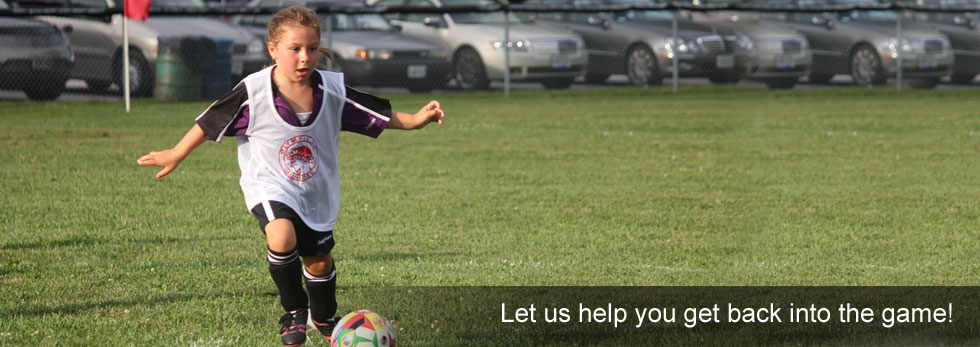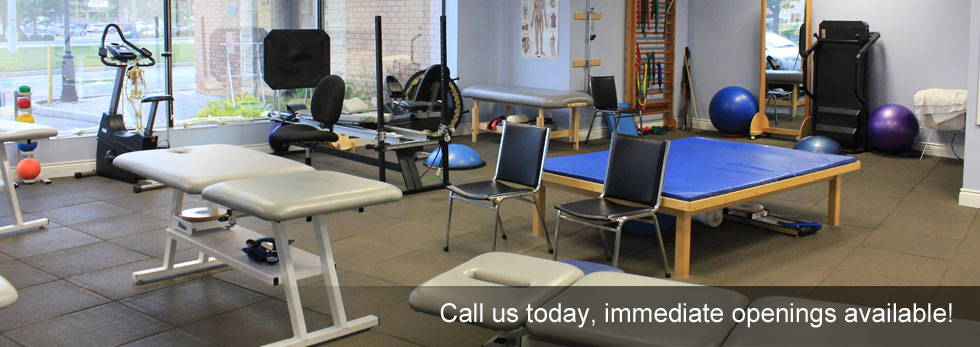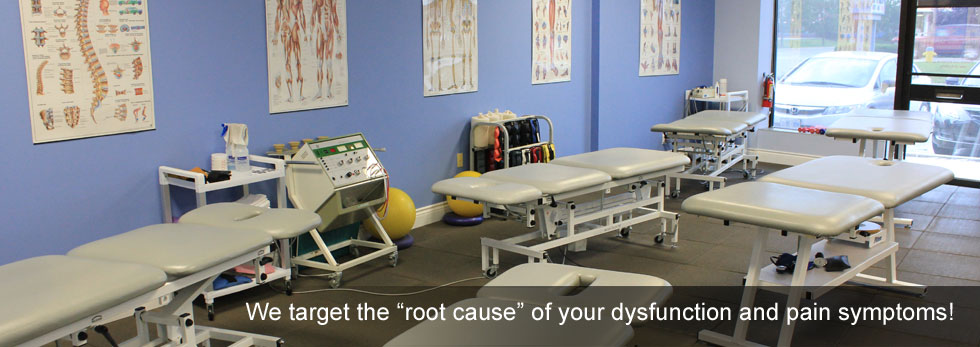Thank you for being so professional and genuinely caring!
– J S
Frequently Asked Questions for Sport and Spine Physiotherapy
Q: What can physiotherapy do for me?
Your physiotherapist at Sport and Spine Physiotherapy can:
- Accurately assess your condition and describe in detail what is causing your impairments
- Improve mobility, strength, flexibility and overall quality of life
- Improve overall joint mechanics and movement patterns
- Provide an alternative to surgery
- Manage or eliminate pain without medication
- Advise you on how to manage your condition independently and prevent reoccurrences
Q: What can physiotherapy do about my neck and back pain?
Your physical therapist will evaluate for specific limitations and deficits in joint movement, strength, and posture. This allows development of the most appropriate combination of manual treatment and exercise in the treatment plan. Flexibility, posture, and body mechanics education is incorporated throughout the patient’s care to reinforce long term back health. Your physical therapist can equip you to manage your condition, prevent re-injury and allow return to life’s activities. Your physiotherapist at Sport and Spine Physiotherapy can also promote pain relief and tissue healing through the use of modalities. Modalities include ultrasound, electrical stimulation, IFC and others. These interventions are research based and clinically effective.
Q: What can physiotherapy do to help me prepare for and recover after surgery?
Your physiotherapist at Sport and Spine Physiotherapy can prepare you for surgery by providing an exercise program that targets the primary muscle groups and any joint limitations affected by your condition. Increased muscle strength and flexibility, as well as what to expect post-surgery will lead to a shorter and more successful surgical outcome.
Your physiotherapist will help you after surgery by increasing range of motion, strength, and mobility, ambulation, balance and help reduce swelling, and post-surgical pain. Patient education on daily activities, home exercise program and limitations is also very important.
Q: My heel hurts when I’m walking and running. Can physiotherapy help me?
A thorough evaluation will be performed by your physiotherapist at Sport and Spine Physiotherapy to determine the cause of the pain. A common condition called plantar fasciitis is a possibility. It can be treated through manual treatment, exercise prescription and modalities. Each of these will be focused on decreasing pain and inflammation, improving joint mobility and overall strength. Your footwear and walking pattern will be evaluated. Appropriate interventions including flexibility and strengthening exercises will be provided. Your physiotherapist may discuss other options such as orthotics.
Q: My elbow is sore and hurts during many of my daily activities. Can physiotherapy help me?
You may have a condition called lateral epicondylitis or tennis elbow. Modalities, exercise and bracing can be helpful. Changes in your work ergonomics and daily activities may also be incorporated. Usually deep friction massage treatment is beneficial, as well as eccentric strengthening.
Q: I work at a computer desk all day. My neck and shoulders hurt all the time. How can physiotherapy help with my pain?
Jim can decrease the tension in your neck and shoulders with modalities and soft tissue mobilization. Any joint restriction of the cervical and or thoracic spine will also be addressed. Your physical therapist can also educate you on stretching, posture, and proper work space ergonomics. These should all contribute toward long term neck and shoulder health.
Q: I sprained my ankle while playing basketball over the weekend. How can physiotherapy help get me back to normal, quicker?
Jim at Sport and Spine Physiotherapy can help speed your recovery from an ankle sprain by decreasing your inflammation and swelling with modalities and education on compression wraps and icing. Your physical therapist can also start exercises to increase your dynamic ankle stability that will help decrease the frequency and severity of future ankle sprains. Regaining full strength and balance will ensure a safe return to your desired activity.
Q: I like to jog or go for bike rides and have started having pain in my knee. What can I do?
Many people experience pain in their knees after long walks, jogs or bike rides. In many cases, the pain is caused by improper tracking of your knee cap or irritation of the cartilage in your knee as you bend and straighten your leg, causing rubbing and irritation. Jim at Sport and Spine Physiotherapy can help relieve the inflammation with modalities and educate you on an exercise program to re-train the quad and glut muscles to , improve patella tracking and improve overall leg mechanics. Typically, an unstable and weak hip will add increase stress to the knee joint which can lead to tissue damage.
Q: My shoulder is really hurting after playing catch this weekend. What should I do?
The pain in your shoulder is most likely caused from overuse and tissue breakdown of the specific muscles that make up the rotator cuff. Jim, your physiotherapist at Sport and Spine Physiotherapy can help decrease your pain with modalities and improve the integrity of your rotator cuff with strengthening, dynamic stabilization, and endurance exercises. Posture, scapular stabilization and spinal mobility is essential to regain full recovery.
Q: I experience hip pain after prolong walking, squatting or running.
The pain in your hip may be due to hip tendonitis, bursitis or early signs of hip OA. Your physiotherapist at Sport And Spine Physiotherapist can help decrease your pain by properly assessing the cause of the symptoms and begin treatment to reduce the inflammation and improve joint strength, hip mechanics and flexibility. Gluteal weakness can lead to a muscle imbalance which can cause abnormal internal rotation of the hip joint, ultimately putting added stress on the hip joint structures, leading to pain symptoms.
Q: I am having difficulty with balance and have had recent falls. What can physiotherapy do to help me?
An evaluation will determine your specific deficits and Jim, your physiotherapist at Sport and Spine Physiotherapy will develop a plan to address these needs. Generally, the treatment plan will involve challenging your balance systems within a controlled environment. Fall prevention techniques will be practiced and discussed. There are various reasons for balance problems and falls. Other medical causes will be examined in conjunction with your doctor.
Q: What is involved in a Physiotherapy Assessment?
Your physiotherapist will ask you to describe your condition, history, lifestyle and goals.
1. Assess your level of mobility, strength, endurance, posture, balance and other physical abilities to determine the impact of your condition on your physical function, whether at work, rest or play.
2. Diagnose your condition and develop a treatment plan to restore movement and reduce pain. Together, you and your physiotherapist will agree on a plan that involves your active participation.
3. Treat your condition and help you understand its effect on your function. Your physiotherapist will measure your progress regularly, and adjust your treatment according to your needs and preferences.
4. Advise you on how to manage your condition independently and prevent reoccurrences or complications
5. Ensure a safe return to an active and healthy lifestyle.
Q: How long will each treatment visit last?
Initial assessments will last 45-60 minutes and subsequent visits will be 60 to 90 minutes in length. Your therapist will recommend how many treatments per week are necessary depending on your injury or problem.
Your session may involve various forms of treatment which will be decided based on your individual needs. Jim, your physiotherapist will always be present and following thru with your every physiotherapy treatment session!
Q: What do I need to bring?
Registration Form – please fill out our Registration Form by arriving 5 minutes early to your first appointment. If you fill out the form in advance, please remember to bring it with you.
Any test results or specialist reports you have.
Shorts and Socks– if you forget them, we have some you can borrow.
Ideally, it’s best to not bring children to your appointment so you can fully focus on your session.
Q: Do I need a doctor’s referral to receive physiotherapy treatment?
You don’t need a doctor’s referral to obtain treatment, but you might want to check with your insurance company and extended health coverage if one is needed for treatment reimbursement.
Q: Do you have a cancellation & no show policy?
There is no cancellation fee but it is courtesy to call and let us know that you will not be attending your scheduled appointment.
Q: What do I need to wear?
You should wear loose fitting clothing so you can expose the area that we will be evaluating and treating. For example, if you have a knee problem, it is best to wear shorts. For a shoulder problem, a tank top is a good choice, and for low back problems, wear a loose fitting shirt and pants, so the treating therapist can perform a thorough examination. We can also give you privacy to change if needed.

















